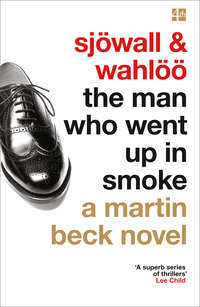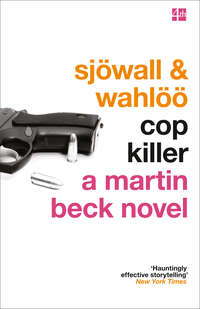
Полная версия
The Fire Engine That Disappeared
At that, conversation ceased.
At Skärmarbrink, Martin Beck got out and took the metro. He did not know which he loathed more, the overcrowded underground or crawling along in traffic. But going by metro had one advantage. It was quicker. Not that he had anything to hurry home for.
But Lennart Kollberg had. He lived in Palandergatan and had a fine wife called Gun, and a daughter who was just six months old. His wife was lying on her stomach on the rug in the living room, studying a correspondence course of some kind. She had a yellow pencil in her mouth and alongside the open papers lay a red eraser. She was wearing an old pyjama top and was idly moving her long naked legs. She looked at him with her large brown eyes and said:
‘Jee-sus, you look gloomy.’
He took off his jacket and threw it into a chair.
‘Is Bodil asleep?’
She nodded.
‘It’s been a damned awful day,’ said Kollberg. ‘And everyone keeps jumping on me. First Rönn, of all people, and then two imbecile cops in Maria.’
Her eyes glittered.
‘And it wasn’t your fault at all?’
‘Anyhow, now I’m off duty until Monday.’
‘I’m not going to beat you,’ she said. ‘What d’you want to do?’
‘I want to go out and eat something hellish good and have five doubles.’
‘Can we afford that?’
‘Yes. Hell, it’s only the eighth: Can we fix a sitter?’
‘I expect Åsa will come.’
Åsa Torell was a policeman’s widow, although she was only twenty-five. She had lived with a colleague of Kollberg’s called Åke Stenström, who had been shot dead on a bus only four months earlier.
The woman on the floor drew down her strong dark eyebrows and rubbed energetically at her papers.
‘There’s an alternative,’ she said. ‘We can go to bed. It’s cheaper and more fun.’
‘Lobster Vanderbilt’s fun too,’ said Kollberg.
‘You think more about food than love,’ she complained. ‘Even though we’ve only been married two years.’
‘Not at all. Anyway, I’ve an even better idea,’ he said. ‘Let’s go and eat first and have five doubles and then go to bed. Call Åsa up now.’
The telephone had a twenty-foot extension cable and was already on the rug. She stretched out her hand and pulled it towards her, dialled a number and got a reply.
As she talked, she turned over on her back, drew up her knees and placed the soles of her feet on the floor. The pyjama top slid up a bit.
Kollberg looked at his wife, thoughtfully regarding the broad patch of thick raven-black hair which spread over the lower half of her abdomen and reluctantly thinned out between her legs. She was looking up at the ceiling as she listened. After a while she drew up her left leg and scratched her ankle.
‘Okay,’ she said, putting down the receiver. ‘She’s coming. It’ll take her an hour to get here, won’t it? Have you heard the latest, by the way?’
‘No, what?’
‘Åsa’s going to train to be a policewoman.’
‘Christ,’ he said absently. ‘Gun?’
‘Yes.’
‘I’ve thought of yet another solution, even better than the last one. First we go to bed and then we go and eat and have five doubles and then we go to bed again.’
‘But that’s almost brilliant,’ she said. ‘Here on the rug?’
‘Yes, call up Operakällaren and order a table.’
‘Look up the number, then.’
Kollberg riffled through the telephone directory as he unbuttoned his shirt and undid his belt; he found the number and heard her dialling it.
Then she sat up, pulled the pyjama top over her head and flung it away across the floor.
‘What are you after? My vanished chastity?’
‘Exactly.’
‘From behind?’
‘However you like.’
She giggled and began to turn, slowly and pliably, kneeling on all fours with her legs wide apart and her dark head down, her forehead pressed against her forearms.
Three hours later, over the ginger sherbet, she reminded Kollberg about something he had not thought about since he had seen Martin Beck disappearing in the direction of the metro station.
‘That awful fire,’ she said. ‘Do you think it was deliberate?’
‘No,’ he said. ‘I can’t believe that. There must be some limit.’
He had been a policeman for more than twenty years and should have known better.
6
Saturday came with sun and bright clear light.
Martin Beck woke slowly, with an unusual feeling of contentment. He lay still, his face burrowed into the pillow, and he tried to hear whether it was late or early in the morning. He heard a blackbird in the trees outside the window and heavy drops falling with irregular splashes into the slush on the balcony. Cars driving past and an underground train braking at the station further away. His neighbour’s door slamming. Gurgling in the water pipes and suddenly, in the kitchen on the other side of the wall, a crash which made him open his eyes immediately. Rolf’s voice:
‘Oh hell!’
And Ingrid:
‘You’re so damned clumsy.’
And Inga hushing them.
He put out his hand for cigarettes and matches, but had to get up on his elbow and dig out the ashtray from under a heap of books. He had lain reading about the battle of Tsushima until four in the morning and the ashtray was full of cigarette butts and dead matches. When he could not be bothered to get up and empty it before going to sleep, he usually hid it under a book to avoid hearing Inga’s prophecies about how one fine day they would all wake up burned to death as a result of his smoking in bed.
His watch said half-past nine, but it was Saturday and he was off duty. Off duty in two ways, he thought contentedly, feeling a twinge of self-reproach. He was going to be alone in the flat for two days. Inga and the children were going with Inga’s brother to his cottage in Roslagen, and staying there until Sunday evening. Martin Beck was of course also invited, but as a weekend alone at home was a rare pleasure which he did not particularly want to forgo, he had pleaded work to avoid having to join them.
He finished his cigarette before getting up and then took the ashtray with him to the toilet and emptied it. He skipped shaving and pulled on his khaki trousers and corduroy shirt. Then he put the book about Tsushima back on the bookshelf, rapidly transformed the bed back into a sofa and went out into the kitchen.
His family were sitting around the table, eating breakfast. Ingrid got up and fetched a cup for him from the cupboard and poured some tea.
‘Oh, Daddy, you can come too, can’t you?’ she said. ‘Look what a marvellous day it is. It’s not such fun when you don’t come.’
‘Can’t, I’m afraid,’ said Martin Beck. ‘It’d be great fun, but—’
‘Daddy has to work,’ said Inga acidly. ‘As usual.’
Again he felt a twinge of conscience. Then he thought that they would have more fun without him, as Inga’s brother always took Martin Beck’s presence as an excuse to bring out the booze and get drunk. Inga’s brother in a sober state was certainly nothing much to write home about and drunk he was almost unbearable. He had, however, one positive feature and that was that on principle he never drank alone. Martin Beck’s thoughts continued in that direction and arrived at the conclusion that he was really doing a good deed by lying and staying at home, as his absence would force his brother-in-law to remain sober.
He had just come to this advantageous conclusion when his brother-in-law rang the doorbell, and five minutes later Martin Beck was able to begin celebrating his coveted free weekend.
It was just as successful as he had hoped. Inga had in fact left food in the freezer for him, but he went out all the same and shopped for dinner. Among other things, he bought a bottle of Grönstedts Monopole cognac and six strong beers. Then he devoted the rest of Saturday to putting down the deck of the model of the Cutty Sark, which he had not had time to touch for several weeks. For dinner he ate cold meatballs, fish roe and camembert on pumpernickel bread, and he drank two beers. He also drank some coffee and cognac and watched an old American gangster film on television. Then he got his bed ready and lay in the bathtub reading Raymond Chandler’s The Lady in the Lake, every now and again taking a sip of cognac which he had placed within reach on the toilet seat.
He felt very well and thought about neither work nor his family.
When he had finished his bath, he put on his pyjamas, switched off all the lights except the reading lamp on his desk, and went on reading and drinking cognac until he felt sleepy and dopey and went to bed.
He slept late on Sunday, then sat in his pyjamas, working on his model ship, and did not dress until afternoon. In the evening, when the family had returned, he took Rolf and Ingrid to the movies and saw a film on vampires.
It was a successful weekend and on Monday morning he felt quite rested and energetic, and at once took up the question of just who Göran Malm had actually been and what he might have had on his conscience. He spent the morning in the offices of various colleagues at the police station and paid a brief visit to the court. When he returned to relate the results of his investigations, there was no one there to tell, for they had all gone for lunch.
He called up the South police station and to his surprise was put straight through to Kollberg, who was ordinarily the first out to lunch, especially on Mondays.
‘Why aren’t you out to lunch?’
‘I was just about to go,’ said Kollberg. ‘Where are you, anyway?’
‘I’m in Melander’s room. Come over and eat here instead, then I know I’ve got you. When Melander and Rönn put in an appearance, we can take a slightly closer look at Göran Malm. If Melander can possibly drag himself away from the scene of the fire. Anyhow, I’ve found out quite a bit about Malm.’
‘Okay,’ said Kollberg. ‘I’ll just get hold of Benny and instruct him, so to speak.’
‘If that’s possible,’ he added.
Benny Skacke was their newest recruit. He had joined the Murder Squad two months earlier, to replace Åke Stenström. Stenström had been twenty-nine when he died and had been regarded as a toddler by his colleagues, especially Kollberg. Benny Skacke was two years younger. Martin Beck took out Melander’s tape recorder and as he waited for the others, he played back the tape he had borrowed from the court. He took a piece of paper and made notes as he listened.
Rönn arrived on the dot of one, and fifteen minutes later Kollberg jerked open the door and said:
‘Well, let’s have it.’
Martin Beck handed over his chair to Kollberg and placed himself by the filing cabinet.
‘It was about car thefts,’ he said. ‘And trading in stolen cars. During last year, the number of undetected car thefts rose so much that there’s reason to believe one or several large, well-organized gangs were occupied with the selling of stolen cars. And presumably also smuggling them out of the country. Malm was probably some kind of cog in the machine.’
‘A large cog or a small one?’ asked Rönn.
‘Small, I should think,’ said Martin Beck. ‘Even very small indeed.’
‘What had he done that he’d got caught?’ said Kollberg.
‘Wait a moment, and I’ll start from the beginning,’ said Martin Beck.
He took up his notes and put them down beside him on the cabinet; then he began to speak, easily and fluently.
‘At about ten o’clock on the night of the twenty-fourth of February, Göran Malm was stopped at a roadblock some two miles north of Södertälje. It was a routine traffic check and he was heading in that direction by chance. He was driving a Chevrolet Impala, 1963 model. The car seemed okay, but as it turned out that Göran Malm was not the owner, they compared the registration number with the current list of stolen cars. The number was indeed there, but according to the list belonged to a Volkswagen and not to a Chevrolet. It appears that the car was given a false number and by mistake, or by chance, it was a hot number. At the first interrogation, Malm said that he had been loaned the car by the owner, who was a friend of his. This owner’s name was Bertil Olofsson. That name was given by Malm and it was on the name plate of the car too. It turned out that this Olofsson was not unknown to the police. In actual fact, he had for some time been suspected of just this kind of car racket. A few weeks before Malm was caught, they had managed to find quite a bit of evidence against Olofsson, but then they couldn’t get hold of him. He has still not been found. Malm maintained that Olofsson had loaned the car to him because he did not need it for a while, as he was to go abroad. When the boys who suspected Olofsson, and had already begun to look for him, heard about this Malm and that the police had got him by chance, they tried to have him remanded in custody. They were convinced that Malm and Olofsson were in some way or other accomplices. When they failed—well, he wasn’t remanded in custody, as you will shortly hear—they put Gunvald, with Hammar’s gracious consent, on to tail Malm. They hoped in this way to get at Olofsson, who in his turn then might reveal the gang. If there was such a gang. And if Olofsson and Malm, in that case, belonged to it.’
Martin Beck crossed the floor and stubbed his cigarette out in the ashtray.
‘Well, that’s about it,’ he said. ‘No, it’s not. The registration certificate and the licence were forged, of course, very skilfully, by the way.’
Rönn scratched his nose and said:
‘Why did they let Malm go?’
‘Insufficient evidence,’ said Martin Beck. ‘Wait till you hear it.’
He bent over the tape recorder.
‘The prosecution pleaded that Malm should be remanded in custody on suspicion of receiving. The motivation being that Malm might complicate the investigation if he was free.’
He switched on the tape recorder and let the spool run on quickly.
‘Here it is. Prosecution’s interrogation of Malm.’
P: Well, Mr Malm, you have heard my case before the court regarding this evening, that is, the twenty-fourth of February, this year. Will you now please tell us in your own words what happened?
M: Well, it was just like what you said. I was driving along the Södertälje road and there was a police car there, one of those police roadblocks, and I stopped of course and…and when the police saw the car wasn’t mine, they took me to the police station.
P: Oh, yes. Well, Mr Malm, how did it happen that you were driving about in a car which wasn’t yours?
M: Well, I was going to go down to Malmö to see a mate of mine and as Berra had—
P: Berra? That’s Bertil Olofsson, is it?
M: Yes, that’s right. Berra, or Olofsson, had loaned me his car for a couple of weeks. I was going to go down to Malmö anyway. So I took the chance of going when I had a car so that I didn’t have to go by train. It’s cheaper too. Well, so I took the car and drove. How was I to know the car was hot?
P: How did it come about that Olofsson loaned you his car for such a long time just like that? Didn’t he need it himself?
M: No, he was going abroad, he said, so he didn’t need it.
P: Oh, yes, so he was to go abroad. How long was he to be away?
M: He didn’t say.
P: Were you thinking of using the car all the time until he came back?
M: Yes. If I wanted to. Otherwise I was to put it in his parking space. He lives in one of those buildings where a parking space sort of goes with the flat.
P: Has Olofsson come back home yet?
M: Not as far as I know.
P: Do you know where he is?
M: No. Perhaps he’s still in France or wherever it was he was going to.
P: Mr Malm, have you a car of your own? M:No.
P: But you have had one, haven’t you?
M: Yes, but a long time ago.
P: Did you often borrow Olofsson’s car on other occasions?
M: No, only this once.
P: How long have you known Olofsson?
M: About a year.
P: Did you often meet?
M: Not often. Sometimes.
P: What do you mean by sometimes? Once a month? Once a week? Or how often?
M: Well, perhaps about once a month. Or twice.
P: So you knew each other quite well, then?
M: Well, fairly.
P: But you must have known each other quite well if he loaned you his car just like that.
M: Yes, of course.
P: What was Olofsson’s profession?
M: What?
P: What did Olofsson do for a living?
M: I don’t know.
P: Don’t you know after having known him for at least a year?
M: No. We never talked about it.
P: What do you yourself do for a living?
M: Nothing special now…not just at the moment, that is.
P: What do you usually do?
M: Different things. Depends on what I can get.
P: What did you do last?
M: I was a car sprayer in a garage in Blackeberg.
P: How long ago was that?
M: Well, last summer. Then the garage shut down in July and I had to leave.
P: And then? Have you looked for other work?
M: Yes, but there wasn’t any.
P: How have you managed financially without work for, let’s see, nearly eight months?
M: Well, it hasn’t been too good.
P: But you must have got money from somewhere, mustn’t you, Mr Malm? You have your rent to pay and a man must eat.
M: Well, I had a bit saved up and I’ve borrowed a bit here and there and so on.
P: What were you going to do in Malmö, anyway?
M: Look up a mate of mine.
P: Before Olofsson offered to lend you the car, you were to go by train, you said. It’s quite expensive to go by train to Malmö, as you said yourself. Could you afford that?
M: We-ell…
P: How long had Olofsson had that car? The Chevrolet?
M: I don’t know.
P: But you must have noticed what car he had when you first met?
M: I didn’t think about it.
P: Mr Malm, you’ve worked with cars quite a bit, haven’t you? You were a car sprayer, you said. Isn’t it strange that you didn’t notice what make of car your friend had? Wouldn’t you have noticed if he had changed his car?
M: No, I didn’t think about it. Anyhow, I never saw much of his car.
P: Mr Malm, wasn’t it in fact so that you were going to help Olofsson sell that car?
M: No.
P: But you knew that Olofsson traded in stolen cars, didn’t you?
M: No, I didn’t know that.
P: No more questions.
Martin Beck switched off the tape recorder.
‘Unusually polite prosecutor,’ said Kollberg, yawning.
‘Yes,’ said Rönn, ‘and ineffective.’
‘Yes,’ said Martin Beck. ‘So then they let Malm go and Gunvald undertook to watch him. They hoped to get at Olofsson through Malm. It’s very probable that Malm worked for Olofsson, but taking Malm’s standard of living into consideration, he can’t have got much for his pains.’
‘He was a car sprayer too,’ said Kollberg. ‘People like that are useful when you’re handling stolen cars.’
Martin Beck nodded.
‘This Olofsson,’ said Rönn. ‘Can’t we get hold of him?’
‘No, he’s still not been traced,’ said Martin Beck. ‘It’s highly possible that Malm was telling the truth during his interrogation when he said that Olofsson had gone abroad. He’ll appear, no doubt.’
Kollberg thumped his fist irritably on the arm of his chair.
‘I just don’t understand that Larsson fellow,’ he said, glancing sideways at Rönn. ‘I mean, how can he maintain he didn’t know why he was watching Malm?’
‘He didn’t need to know, did he?’ Rönn asked. ‘Don’t start knocking Gunvald again now.’
‘For Christ’s sake, he must have known that he had to keep his eyes open for Olofsson. Otherwise there wasn’t much point in tailing Malm.’
‘Yes,’ said Rönn tranquilly. ‘You’ll have to ask him when he’s better, won’t you?’
‘Huh,’ said Kollberg.
He stretched himself so that the seams of his jacket creaked.
‘Oh, well,’ he said. ‘That car business is not our headache, at any rate. And thank God for that.’
7
On Monday afternoon, it looked as if Benny Skacke, for the first time in his life in his capacity as a member of the Murder Squad, would have to solve a murder on his own.
Or at least a case of manslaughter.
He was sitting in his office at the South police station, busy with a task set for him by Kollberg before going to Kungsholms gatan. That is, he was listening for the telephone and was sorting reports into different files. This sorting process was slow, for he read carefully through every report before filing it. Benny Skacke was ambitious and painfully conscious of the fact that even if he had learned everything there was to learn about investigation into murder at the police training college, he had not really had any opportunity of putting his knowledge into practice. In expectation of a chance of showing his hidden talents in this field, he tried in every way to acquire a share in his older colleagues’ experiences. One of his methods was to listen in on their conversations as often as possible, something which was already driving Kollberg crazy. Another was to read old reports, which he was in the act of doing when the telephone rang.
It was a man on the reception desk in the same building.
‘I’ve a guy here who says he wants to report a crime,’ he said, somewhat nonplussed. ‘Shall I send him up, or—’
‘Yes, do that,’ said Assistant Inspector Skacke immediately.
He replaced the receiver and went out into the corridor to let in his visitor. Meanwhile he wondered what the man in reception had been about to say when he was interrupted. Or? Perhaps—‘or shall I tell him to go to the proper police?’ Skacke was a sensitive young man.
His visitor came slowly and unsteadily up the stairs. Benny Skacke opened the glass doors for him and involuntarily fell back a step at the acrid smell of sweat, urine and stale alcohol. He went ahead of the man into his office and offered him the chair in front of his desk. The man did not sit down at once, but remained standing until Skacke himself had sat down.
Skacke studied the man in the chair. He looked between fifty and fifty-five, was scarcely more than four feet five inches and very thin, weighing not more than about seven stone. He had thin, ash-blond hair and faded blue eyes. His cheeks and nose were covered with red veins. His hands were trembling and a muscle in his left eye was twitching. His brown suit was spotted and shiny and the machine-knitted vest under his jacket had been darned with wool of another colour. The man smelled of alcohol but did not appear to be drunk.
‘Well, you want to report something? What’s it about?’
The man looked down at his hands. He was nervously rolling a cigarette end between his fingers.
‘Do smoke if you want to,’ said Skacke, pushing a box of matches across the desk.
The man picked up the box, lit his dog-end, coughed drily and hoarsely and raised his eyes.
‘I’ve killed the missus,’ he said.
Benny Skacke stretched out his hand for his notepad and said in a voice which he considered calm and authoritative:
‘Oh, yes. Where?’
He wished that Martin Beck or Kollberg had been there.
‘On the head.’
‘No, I didn’t mean that. Where is she now?’
‘Oh. At home. Number 11 Dansbanevägen.’
‘What’s your name?’ asked Skacke.
‘Gottfridsson.’
Benny Skacke wrote the name down on the pad and leaned forward with his forearms resting on the desk.
‘Can you tell me how it happened, Mr Gottfridsson?’
The man called Gottfridsson chewed his lower lip.
‘Well,’ he said. ‘Well, I went home and she began nagging and going on at me. I was tired and couldn’t be bothered to answer back so I told her to shut up, but she just went on and on. Then I saw red and took her by the throat and she began to kick and yell and so I bashed her over the head several times. Then she fell down and after a while I got scared and tried to bring her round but she just lay there on the floor.’








